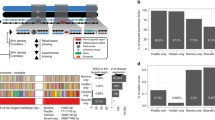Abstract
In this chapter, we describe how Long Fragment Read (LFR) technology can be applied to samples consisting of very few cells (5–20) to enable complete genome sequencing and haplotyping with a very low false positive error rate. LFR is a method for processing DNA or cells prior to sequencing on any second-generation DNA sequencing platform (e.g., MGI’s DNBSEQ, Illumina sequencers, etc.). First, the LFR process incorporates a low-bias whole genome amplification step allowing accurate sequencing from very low DNA inputs (as low as 32 picograms, the mass contained within 5 diploid human cells). In addition, LFR enables the haplotyping of nearly all genomic variations with N50 contig lengths up to ~1 Mb. Furthermore, if data from this method are analyzed with parental genotype data, it is possible to generate phased variants in uninterrupted contigs spanning entire chromosomes. Importantly, the barcoding process utilized in this method allows for the detection and correction of most amplification, sequencing, and mapping errors, yielding false positive error rates as low as 10−9. Finally, the cost of this method is modest and enables extremely high-quality whole genome sequence and haplotype data from as few as 5 cells. We know of few other methods that can achieve this.
Access this chapter
Tax calculation will be finalised at checkout
Purchases are for personal use only
Similar content being viewed by others
References
Drmanac R (2006) Nucleic Acid Analysis by Random Mixtures of Non-Overlapping Fragments. WO 2006/138284 A2
Peters BA, Kermani BG, Sparks AB, Alferov O, Hong P, Alexeev A, Jiang Y, Dahl F, Tang YT, Haas J, Robasky K, Zaranek AW, Lee JH, Ball MP, Peterson JE, Perazich H, Yeung G, Liu J, Chen L, Kennemer MI, Pothuraju K, Konvicka K, Tsoupko-Sitnikov M, Pant KP, Ebert JC, Nilsen GB, Baccash J, Halpern AL, Church GM, Drmanac R (2012) Accurate whole-genome sequencing and haplotyping from 10 to 20 human cells. Nature 487(7406):190–195. https://doi.org/10.1038/nature11236
Peters BA, Liu J, Drmanac R (2014) Co-barcoded sequence reads from long DNA fragments: a cost-effective solution for "perfect genome" sequencing. Front Genet 5:466. https://doi.org/10.3389/fgene.2014.00466
Dean FB, Hosono S, Fang L, Wu X, Faruqi AF, Bray-Ward P, Sun Z, Zong Q, Du Y, Du J, Driscoll M, Song W, Kingsmore SF, Egholm M, Lasken RS (2002) Comprehensive human genome amplification using multiple displacement amplification. Proc Natl Acad Sci U S A 99(8):5261–5266. https://doi.org/10.1073/pnas.082089499
Peters BA, Kermani BG, Alferov O, Agarwal MR, McElwain MA, Gulbahce N, Hayden DM, Tang YT, Zhang RY, Tearle R, Crain B, Prates R, Berkeley A, Munne S, Drmanac R (2015) Detection and phasing of single base de novo mutations in biopsies from human in vitro fertilized embryos by advanced whole-genome sequencing. Genome Res 25(3):426–434. https://doi.org/10.1101/gr.181255.114
Schaaf CP, Gonzalez-Garay ML, Xia F, Potocki L, Gripp KW, Zhang B, Peters BA, McElwain MA, Drmanac R, Beaudet AL, Caskey CT, Yang Y (2013) Truncating mutations of MAGEL2 cause Prader-Willi phenotypes and autism. Nat Genet 45(11):1405–1408. https://doi.org/10.1038/ng.2776
Author information
Authors and Affiliations
Corresponding author
Editor information
Editors and Affiliations
1 Electronic Supplementary Material
Rights and permissions
Copyright information
© 2023 The Author(s), under exclusive license to Springer Science+Business Media, LLC, part of Springer Nature
About this protocol
Cite this protocol
McElwain, M.A., Peters, B.A. (2023). Accurate Sequencing and Haplotyping from 10 Cells Using Long Fragment Read (LFR) Technology. In: Peters, B.A., Drmanac, R. (eds) Haplotyping. Methods in Molecular Biology, vol 2590. Humana, New York, NY. https://doi.org/10.1007/978-1-0716-2819-5_5
Download citation
DOI: https://doi.org/10.1007/978-1-0716-2819-5_5
Published:
Publisher Name: Humana, New York, NY
Print ISBN: 978-1-0716-2818-8
Online ISBN: 978-1-0716-2819-5
eBook Packages: Springer Protocols



